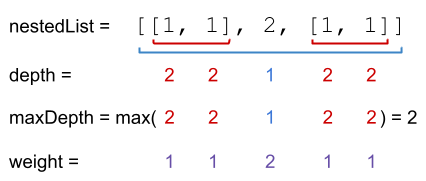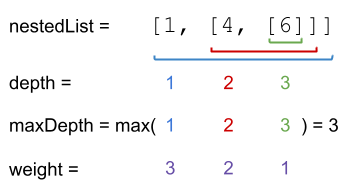You are given a nested list of integers nestedList. Each element is either an integer or a list whose elements may also be integers or other lists.
The depth of an integer is the number of lists that it is inside of. For example, the nested list [1,[2,2],[[3],2],1] has each integer's value set to its depth. Let maxDepth be the maximum depth of any integer.
The weight of an integer is maxDepth - (the depth of the integer) + 1.
Return the sum of each integer in nestedList multiplied by its weight.
Example 1:
Input: nestedList = [[1,1],2,[1,1]] Output: 8 Explanation: Four 1's with a weight of 1, one 2 with a weight of 2. 1*1 + 1*1 + 2*2 + 1*1 + 1*1 = 8
Example 2:
Input: nestedList = [1,[4,[6]]] Output: 17 Explanation: One 1 at depth 3, one 4 at depth 2, and one 6 at depth 1. 1*3 + 4*2 + 6*1 = 17
Constraints:
1 <= nestedList.length <= 50- The values of the integers in the nested list is in the range
[-100, 100]. - The maximum depth of any integer is less than or equal to
50.
Companies:
LinkedIn
Related Topics:
Stack, Depth-First Search, Breadth-First Search
Similar Questions:
// OJ: https://leetcode.com/problems/nested-list-weight-sum-ii/
// Author: github.com/lzl124631x
// Time: O(N)
// Space: O(N)
class Solution {
private:
int getDepth(vector<NestedInteger>& nestedList) {
int ans = 0;
for (auto &item : nestedList) ans = max(ans, item.isInteger() ? 0 : getDepth(item.getList()));
return 1 + ans;
}
int getSum(vector<NestedInteger>& nestedList, int weight) {
int sum = 0;
for (auto &item : nestedList) sum += item.isInteger() ? (item.getInteger() * weight) : getSum(item.getList(), weight - 1);
return sum;
}
public:
int depthSumInverse(vector<NestedInteger>& nestedList) {
int depth = getDepth(nestedList);
return getSum(nestedList, depth);
}
};Each integer get added one extra time for the mere existence of each one level under it.
// OJ: https://leetcode.com/problems/nested-list-weight-sum-ii/
// Author: github.com/lzl124631x
// Time: O(N)
// Space: O(N)
class Solution {
private:
public:
int depthSumInverse(vector<NestedInteger>& list) {
queue<NestedInteger> q;
for (auto &item : list) q.push(item);
int ans = 0, unweighted = 0;
while (q.size()) {
int cnt = q.size();
while (cnt--) {
auto ni = q.front();
q.pop();
if (ni.isInteger()) {
unweighted += ni.getInteger();
} else {
for (auto &item : ni.getList()) q.push(item);
}
}
ans += unweighted;
}
return ans;
}
};
